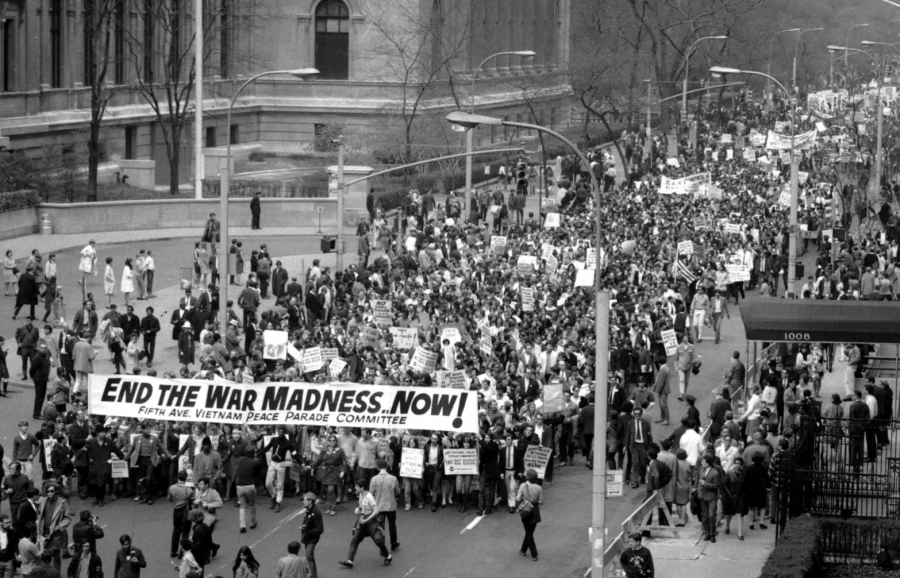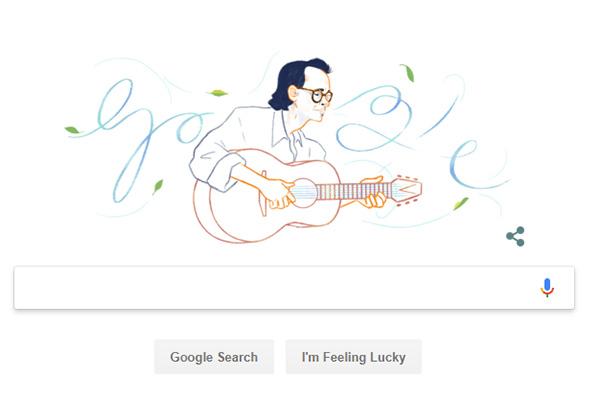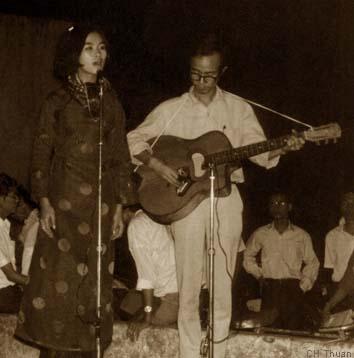
The 'Bob Dylan of Vietnam': Trinh Cong Son's anti-war music
In 2016, before the end of his term, the former New Zealand ambassador to Vietnam, Haike Manning, made a music video in which he performed the famous song 'Let's Love each other' by Trinh Cong Son. In the same year, former US President Barack Obama, during his official visit to Vietnam, expressed deep admiration for the song The Great Circle of Vietnam (Nối Vòng Tay Lớn) by Trinh Cong Son as an example of peace, humanity, and friendship. Therefore, Son and his anti-war music albums have been widely known not only in Vietnam but also around the world since the 1950s until now. He was dubbed the most famous Vietnamese musician by The Washington Post (Vietnamese Songwriter Trinh Cong Son Dies, 2001).
In this article, Son’s awe-inspiring influence during and after the Vietnam War will be described and critically analyzed by making use of documents, literature, and domestic and international presses to ensure the persuasive delivery of his global success. The artistic practice of Son with the Da Vang Album will also be peeled off by investigating his work through the lens of globalization, specifically the concepts of hybridization, cosmopolitanism, and world music.
Anti-war music and globalization
When World War II ended in 1945, followed by the beginning of the Indochina War or also called the Vietnam War from 1955 to 1975, the rise of pacifism gained a peak around the globe as the anti-war musical category was significantly popularized. According to the research of Gillibrand (2019) about the two-sided impact between movements against the Vietnam War and the explosion of anti-war music, ‘In the midst of victorious rhetoric from the government, disturbing insight from the news media, and chaos from the protests, people heard the music of the Vietnam War era. The 1960s were known as a time of change, ranging from revised social norms to changing political stances to new popular music. Everyone seemed to have something to say about the war, musicians being no exception. A significant wave of anti-war songs broadcasted across the nations, such as Bob Dylan's Blowin' in the Wind (1963), Barry McGuire's Eve of Destruction (1965), John Lennon's Give Peace a Chance (1969 ), and many more hits that propagate Vietnam war crimes. This has become a musical trend that represents a generation of artists and a prominent period of the world's history in the context of intense globalization.

Protesters demonstrating against the Vietnam War, New York City, April 27, 1968.
Music has become the universal language that springs from the same aspiration for freedom and moves towards the same peace-seeking outcome
The Vietnam War and globalization were synced as newspapers, radio, and television allowed worldwide people to observe the cruel battles in Vietnam. The anti-war music movement during that period is the embodiment of the dynamics of globalization since the concept of globalization taken widely "refers to the formation of a worldwide historical field and involves the development of global memory, arising from shared global experiences" (Nederveen Pieterse, 2015). The pain of war is a common cry of humanity as people had gone through the darkest years in history together. No matter what ethnicities, religions, or nationalities, when anti-war songs are sung around the world, music has become the universal language that springs from the same aspiration for freedom and moves towards the same peace-seeking outcome: "such shared global experiences range from intercivilizational encounters such as long-distance trade and migration to slavery, conquest, war, imperialism, colonialism" (Nederveen Pieterse, 2015).
Humanistic music philosophy in the Da Vang album
Trinh Cong Son (February 28, 1939 – April 1, 2001) was one of the greatest musicians of the Vietnamese new music generation (Nguyen, 2019). In his youth, he attended the Lycée Français and Providence schools in Hue, then he went to Saigon to study philosophy at the Lycée Jean Jacques Rousseau Saigon and graduated with a baccalaureate degree. Hence, the philosophy of anti-war, selflessness and kindness permeates every word of his music. During his musical career, Son has composed more than 600 songs. Dedicating his life to music and fighting on the cultural front, Son did not marry, he spent the last days of his life with his guitar and died quietly.
Trinh Cong Son in Saigon 1966
Trinh Cong Son's anti-war music is the symbol of Vietnamese anti-war songs that was made into an official music genre named Trinh music in Vietnam. John C. Schafer in his research about Trinh music stated that "in southern cities in the late 1960s and early 1970s everyone, but especially students, were listening to his songs and singing them themselves. These songs were the anthems of the young people during the war, expressing their yearning for peace and their love for their native land’ (Schafer, 2007).
Undeniably, young Vietnamese generations in the 1960s and early 1970s were blessed that the Da Vang album nurtured their youth with resilience, sympathetic perception, and humanitarian awareness of the painful war, destruction, death, and suffering that "strongly influenced the anti-war movements in the South of Vietnam" (Nguyen, 2019). Da Vang was released by Nhan Ban publisher in 1967 and includes a collection of 14 songs. The album was composed by Trinh Cong Son. He played the guitar and harmonized with other traditional instrumental musicians. The CDs were fastly sold across the South of Vietnam and then to the North after Khanh Ly's first performance on the Quan Van stage in Saigon. Living at the time when his homeland was rained on booms and pullets, his works capture the Vietnam War from different angles like a witness of history. The lyrics of the Da Vang album originated from emotions and realistic narratives, talking about the miserable condition of people during the war, portraying the dreadful ashes of boom left over on the pile of corpses, the fields, the river, and the broken shape of Motherland.
‘Oh, bombs and bullets plow on corps
Oh, smashed Vietnamese yellow skin
That flesh and blood is sacred’
Now, tomorrow (1967)
The influence of the Da Vang album on Vietnam
There are three reasons why the Da Vang album highly influenced Vietnamese people. Firstly, Son did not attack the authorities or the political regimes with extreme screams but only criticized the war crimes, violent manners, and abusive direction. Within his music philosophy, Son has formed a clear abandonment of political intention or bias. The spirit of his songs is only to convey encouragement to love, encouragement to live, and encouragement to speak the voice of intense desire for peace to the nation honestly and sincerely. Therefore, his music is "from the people and for the people" (Trinh, 2011). Specifically, inspired by the people and targeted to the people, the Da Vang album embraces students, farmers, workers, and intellectuals to subtitle their freedom wishes by choosing the most common, honest, and condensed lyrics. It was because of the wisdom and ingenuity in the choice of words that the lyrics became familiar and easy to remember for all classes of Vietnamese society at that time.
‘The war took away friends
The horse died on the hill of his homeland
Under the sun, is there humanity left?
My sister, her lips beg for mercy
Oh humanity, the sun in me…’
The Sun In Me (1970)
Secondly, almost all his songs are harmonized on a folk beat with the narrative rhythm of recitativo base and allegro flow. These elements blended into a light and simple musical articulation, neither too cheerful nor too sorrowful that everyone can hum along without any complicated melodic theory or vocal skills. Correspondingly, this genre of music touched the hearts of the people because, in the midst of war, the Da Vang album was gently saving Vietnamese wounded souls.
During the war, Vietnamese people yearned for peace. However, it is the positive and resilient philosophy of Trinh's music that awakens their minds to acknowledge the situation, believe in the strength of unity, and continue to endure. Among Vietnamese society, songs in the Da Vang album were hand-copied on paper, on cigarette covers, and on cassette tapes. Generally, all forms and means are utilized. At home, in cafe shops, in the universities, and even in the SOS medical booth at the frontlines battlefields (Nguyen, 2019), Son's anti-war music was unintentionally reformed into the weapon of Vietnamese inner strength.
The harmonious chord of globalization
We can understand the impact of the Da Vang album on a global scale, using the concept of cosmopolitanism. This concept specifies the mixture of global cultures as it ‘refers to the ideology that all human beings belong to a single community, based on a shared morality’ (Smith, 2013). In a national television interview in 1997, Son expressed that since he was influenced by both Buddhism of the East and surrealism of the West, the Da Vang album is imbued with the existential perspectives of Western literary authors in the 1960s such as Jean-Paul Sartre and Albert Camus, combined with Buddhist philosophies of causality and compassion (Trinh, 2011). Moreover, back in 1969, Da Vang was popularized in Japan with more than two million discs sold over the year, and it achieved the Golden Disc Award (Schafer, 2007). The songs were translated into Japanese and performed by top Japanese singers such as Tokiko Kato, Yoshimi Tendo, and Aya Shimazu. Thus, the harmony of Vietnamese and Japanese culture forms the characteristic of cosmopolitanism in the Da Vang album.
‘What Trinh Cong Son represents to Vietnamese people is very similar to what Bob Dylan represents to Americans’ (Schwartz, 2011)
Trinh Cong Son was honored with the World Peace Music Award in 2004 for a "lifetime tirelessly longing for and fighting for peace" (L, 2017) along with other anti-war artists namely Bob Dylan, Joan Baez, and Harry Belafonte (L, 2017). Mentioning Bob Dylan, during his special concert in Vietnam in 2004, the show "started with an hour of songs composed by Trinh Cong Son" (Schwartz, 2011) as a contribution to Son as he was dubbed the ‘Bob Dylan of Vietnam’ by The Washington Post in 2001 (Vietnamese Songwriter Trinh Cong Son Dies, 2001).
By using Vietnamese folk musical instruments such as flute, bamboo harp, and single-stringed lute, combined with unique materials in a tone such as ornamentation, pause, and humming, the Da Vang album has bold colors of traditional Southeast Asian music, punctuated by folk tunes that are ‘Vietnamized’ in its way. These exotic sounds (Frith, 1998) were strange to the American public when they were played on the radio in the years 1969 to 1975, but it also made them attractive and appealing.
A farewell

Trinh Cong Son on Google doodle 2019
In conclusion, the harmonic chord of cosmopolitanism in Trinh Cong Son’s lifetime dedication to anti-war music is evidently linked to the dynamics of globalization. The Da Vang album stepped out of its homeland and was welcomed by international music lovers for sharing the same aspiration to the matter of peace enduring in music, representing "the ideology that all human beings belong to a single community, based on a shared morality" (William, 2013). Moreover, the Da Vang album also subverted nationalism and identity politics’ (Nederveen Pieterse, 2015) by going against the brutal governance of the authorities. Son’s national and international influence was honored by the Google Doodle logo on his 80th birthday anniversary (28/02/1939 - 28/02/2019) and has once again proved global recognition for this talented musician.
References
Frith, S. (1998). World Music, Politics, and Social Change. Manchester University Press.
Gillibrand, I. (2019). A Different Master of War: The Influence of the Folk Music Revival on the Antiwar Movement during the Vietnam Era. Journal of Folklore Research, 56(3), 267-284.
Harrison, B. T. (1993). Roots of the Anti‐Vietnam war movement. Studies in Conflict & Terrorism, 16(2), 99-111.
Nederveen Pieterse, J., 2015. Globalization and Culture: 3rd Revised edition. Lanham, MD: ROWMAN & LITTLEFIELD Publishers.
Nguyễn, T. T. (2019). An investigation into the English translational versions of Trinh Cong Son’s songs in terms of semantic and syntactic features. Đại học Dân lập Hải Phòng.
Schafer, J. C. (2007). The Trịnh Công Sơn Phenomenon. The Journal of Asian Studies, 66(3), 597-643.
Schwartz, R. (2011, November 4). Bob Dylan’s First Vietnam Show From Stage Front. Billboard.
Smith, W. (2013). Cosmopolitanism. In Oxford Research Encyclopedia of International Studies.
Trịnh, C. S. (2011). Trịnh Công Sơn - Tôi Là Ai Là Ai. Nhà Xuất Bản Trẻ.
Vietnamese Songwriter Trinh Cong Son Dies. (2001, April 03). The Washington Post.
